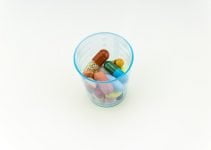
What is Menopause?
Even though this isn’t all about menopause, it’s imperative that we talk about what it is and when you could be experiencing. You are considered menopausal when you go twelve consecutive months without a period and generally occurs sometime around your early 50s [1].
It’s a natural process when the body stops producing eggs, that every woman will go through and while some can skate by without any symptoms, others might not be so fortunate and deal with emotional changes, sleep changes, and other physical symptoms such as vaginal dryness, hot flashes, weight gain, dry skin, etc.
This is also where one could experience hormonal breast pain, which is what will be discussed here.
Breast Pain is Experienced by Many
Breast pain is experienced by 70% of women during their lifetime. While most women experience this discomfort during pregnancy or when they’re pre-menstrual, some will experience it during peri-menopause when the body is transitioning into actual menopause.
In medical terms, breast pain is known as mastalgia or mammalgia, and it’s defined as discomfort, tenderness, or pain in one or both of the breasts. This pain can be cyclical, associated with hormonal changes, or non-cyclical, which is non-hormone related.
Most women who experience breast pain associated with menopause have cyclical pain, as it’s brought on during the hormonal changes of pre- or perimenopause.
Cause of Breast Pain During Menopause
Menopause causes hormonal fluctuations as a result of the changing levels of estrogen and progesterone in the body. The levels of these hormones are rising and falling unpredictably which is the cause of the pain.
Once they level out and estrogen is no longer being created, you should feel better.
These fluctuations are the cause of breast pain related to menopause. Pain should subside once your periods stop and your body stops the production of estrogen.
Symptoms
Breast pain during menopause has several possible symptoms, including tenderness, swelling, tightness, soreness, burning, aching, and dullness of the breast. These symptoms can be constant or come and go.
One of the characteristics of breast pain during menopause is that unlike the discomfort you may have experienced with your period which is generally dull and achy, this is more like a burning, throbbing, or stabbing sensation and overall soreness.
Some may feel it in one breast while others might feel it in both. It can really vary between women.
Treatment
While you may not be able to eliminate your breast pain, there are a variety of ways to cope with the breast pain to help you be more comfortable during this transition in life.
-
Medication – Many like to turn to tried and true methods of over the counter pain meds. Just ensure that you aren’t taking too much and that you talk to your doctor if it is something that you need daily in order to maintain your lifestyle. However, there are other options that you could try first.
Diet – Maintaining a healthy diet with plenty of vitamins B and E, as well as fiber, can help your body balance the levels of estrogen causing some of your symptoms.
Supplements – In addition to diet you can try supplementing with vitamins. Some of them include vitamin B, vitamin E, and flax seed or fish oil (omega-3 fatty acids). These are products that you can find in your local drug store.
Eliminating Caffeine – Stimulants such as caffeine dilate your blood vessels, which lead to swelling and pain.
Properly Fitting Bra – Making sure that your bra is properly fitted for your body will help alleviate pain caused by bras that are too constricting. Also, you’ll want to wear a bra that fits when working out and is supportive. There is no substitute for a good fitting bra.
At Home Remedies – Simple remedies, such as heating pads, warm showers, and ice packs can help with the pain and discomfort experienced with mammalgia. Alternating between heat and cool can have a profound effect on the pain you may be experiencing. You can also try getting acupuncture which appears to have multiple benefits for women who are experiencing their transition.
Natural Remedies – Primrose oil can help reduce inflammation due to being rich in omega-3 fatty acids. Applying the oil topically can alleviate breast pain and swelling. The oil can also be consumed orally by placing several drops in vegetable oil caps found at any health food store.
Alternative Medicines -Herbal remedies can be an effective treatment for some women. Two herbs that are helpful are Phytoestrogen and non-estrogenic herbs. These herbs replace the missing or lowering estrogen and balance your overall hormone levels.
Hormone Replacement Therapy – In severe cases, natural progesterone can help with painful breasts by helping your body balance its hormone fluctuations. HRT can be difficult to maintain at a tolerable level, so you will need to be under close supervision by your doctor to make sure your levels are reacting appropriately.
Conclusion
While it is an annoyance and something that we don’t generally enjoy dealing with, breast pain is normal. While it is uncomfortable there are many ways to help counteract that pain and help you feel better in the long run until the change has run its course.
Breast pain associated with menopause should go away when your periods stop and the levels of estrogen your body is producing have dropped and are no longer fluctuating irregularly.
However, if your pain doesn’t go away by then or if it becomes unbearable at any point, you should seek a doctor and get examined. In some rare cases breast pain can be caused by more serious health conditions.
So again, while normal, if it is affect your normal routine, get checked out, but you will get through this normal juncture in life.



